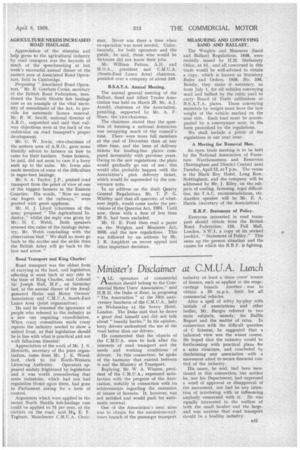AGRICULTURE NEEDS INCREASED ROAD HAULAGE.
Page 75

If you've noticed an error in this article please click here to report it so we can fix it.
Appreciation of the stimulus and help given to the agricultural industry by road transport was the keynote of much of the speechmaking at last week's successful annual dinner of the eastern area of Associated Road Operators, held in Cambridge.
Proposing " Associated Road Operators," Mr. R. Gresham Cooke, secretary of the British Road Federation, mentioned the North Shields fish haulage case as an example of the vital necessity of amendment of the Act, to provide for automatic licence renewal. Mr. R. W. Sewill, national director of A.R.O., responded and said that railway objections were at the back of the restriction on road transport's proper development.
Mr. G. W. Irwin, vice-chairman of the eastern area of A.R.4., gave some friendly advice to farmers on how to cater for their hauliers. Some farmers, he said, did not seem to care if a lorry sank up to the axles. Mr. Irwin also made mention of some of the difficulties in sugar-beet haulage.
Mr. S. A. Taylor, J.P., praised road transport from the point of view of one of the biggest farmers in the' Eastern Counties. His words, "Now we snap our fingers at the railways," were greeted with great applause.
Mr. H. J. Lloyd (chairman of the area) proposed "The Agricultural Industry," whilst the reply was given by Mr. H. C. Webb. Both speakers stressed the, value of the haulage industry, Mr. Webb concluding with the observation that" We shall no more go back to the scythe and the sickle than the British Army will go back to the bow and arrow."
Road Transport and King Charles!
Road transport was the oldest form of carrying in the land, and legislation affecting it went back at any rate to the time of King Charles, said Colonel Sir Joseph Nall, M.P., on Saturday last, at the annual dinner of the Amalgamated Horse and Motor Owners' Association and C.M.U.A. South-East Lanes Area (joint organization).
He said he resented the ignorance of people who referred to the industry as a new one requiring consolidation. When crazy committees made crazy reports the industry needed to show a united front, so that legislation should be in line with what is practical and not with fallacious theories!
Appreciation of the work of Mr. J. S. FIowarth, secretary of the joint organization, came from Mr. J. E. Woodford, clerk to the North-Western
Lieencing Authority. Operators appeared unduly frightened by legislation and it was worth remembering that some industries, which bad not had regulation thrust upon them, had gone to Parliament asking for a form of control.
Arguments which were applied in the recent North Shields fish-haulage case could be applied to 75 per cent, of the carriers on the road, said Mr • E. F. Topham, Manchester C.M.U.A. Chair man. Never was there a time when co-operation was more needed. Unfortunately, for both operators and the public, he said, those who would be dictators did not know their jobs.
Mr. William Patton, A.H. and M.O.A., president and C.M.U.A. (South-East Lanes Area) chairman, presided over a company of about 240.
B.S.A.T.A. Annual Meeting.
The annual general meeting of the Ballast. Sand and Allied Trades Association was held on March 29, Mr. A.J. Arnold, chairman of the Association, presiding, supported by Mr. A. F. Shaw, the vice-chairman.
The chairman stated that the question of forming a national federation was occupying much of the council's time. There were more full members at the end of December than at any other time, and the issue of delivery tickets for loading-line plates compared favourably with previous years. Owing to the new regulations, the plate would gradually go out of use ; this would also probably happen with the Association's pink delivery ticket, which would be superseded by the conveyance note.
In an address on the draft Quarry General Regulations. Mr. T. P. G. Whitley said that all quarries, of whatever depth, would come under the provisions of the Quarries Act, 1894. Until now, those with a face of less than 20 ft. had been excluded.
Mr. H. E. Ford then read a paper on the Weights and Measures Act, 1936, and the new regulations. This was followed by an address by Mr. J. R. Amphlett on recent appeal and other important decisions.






















































































































